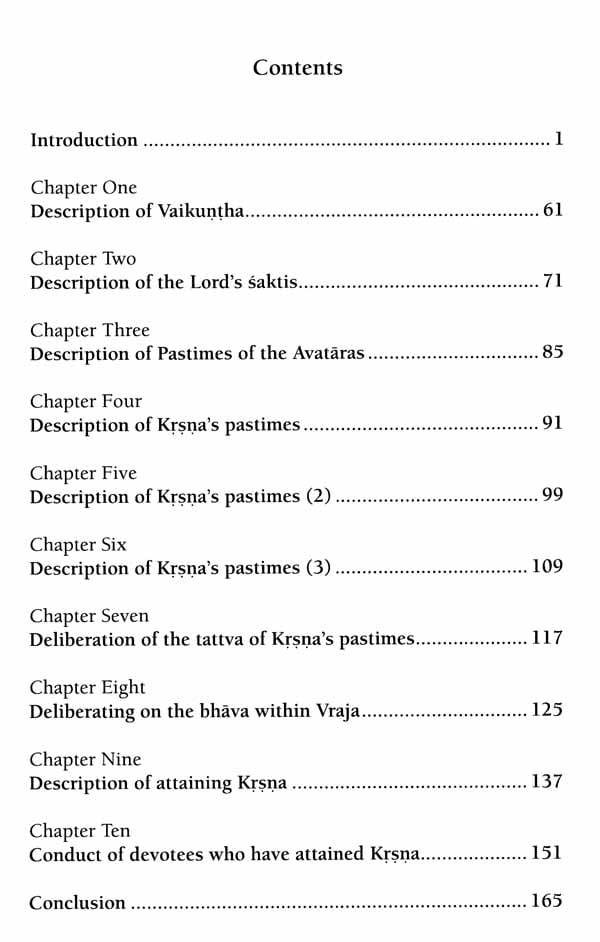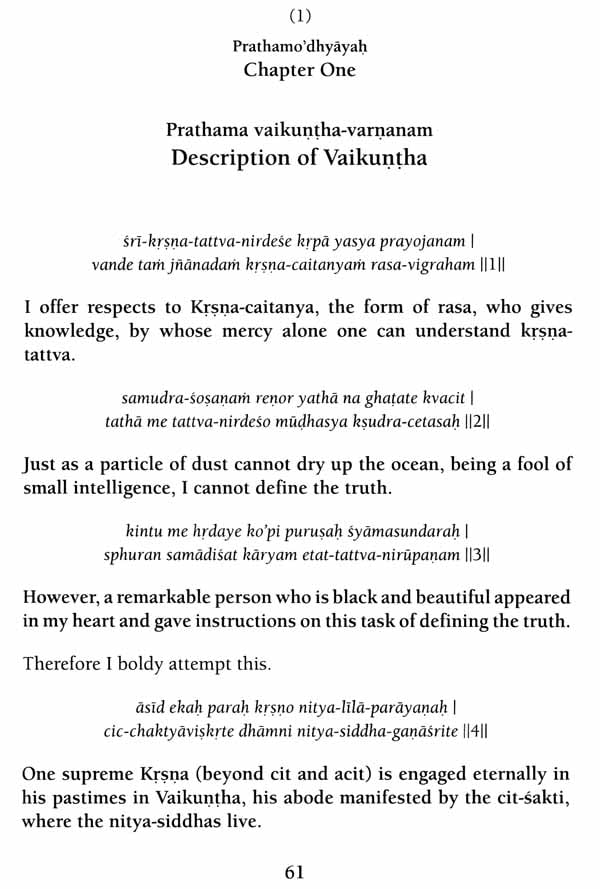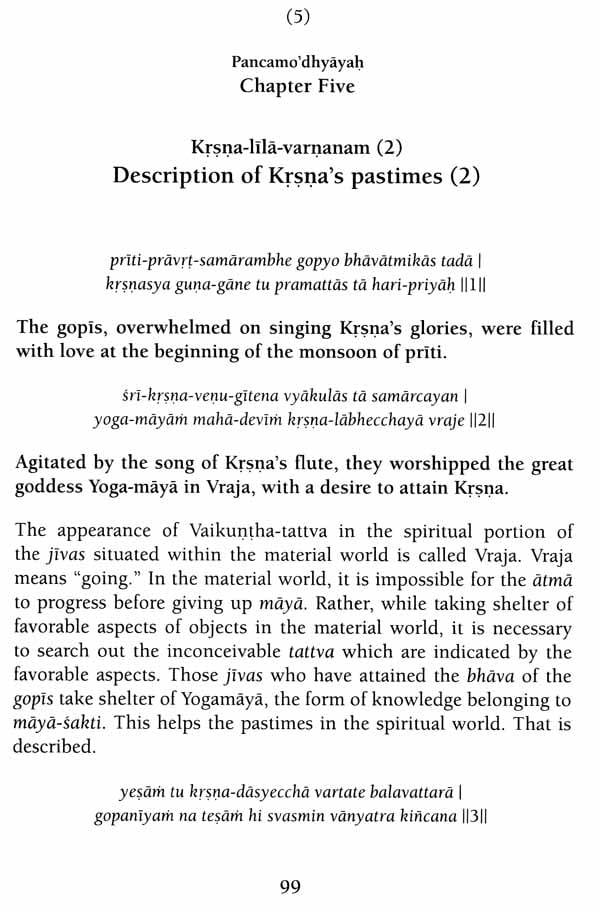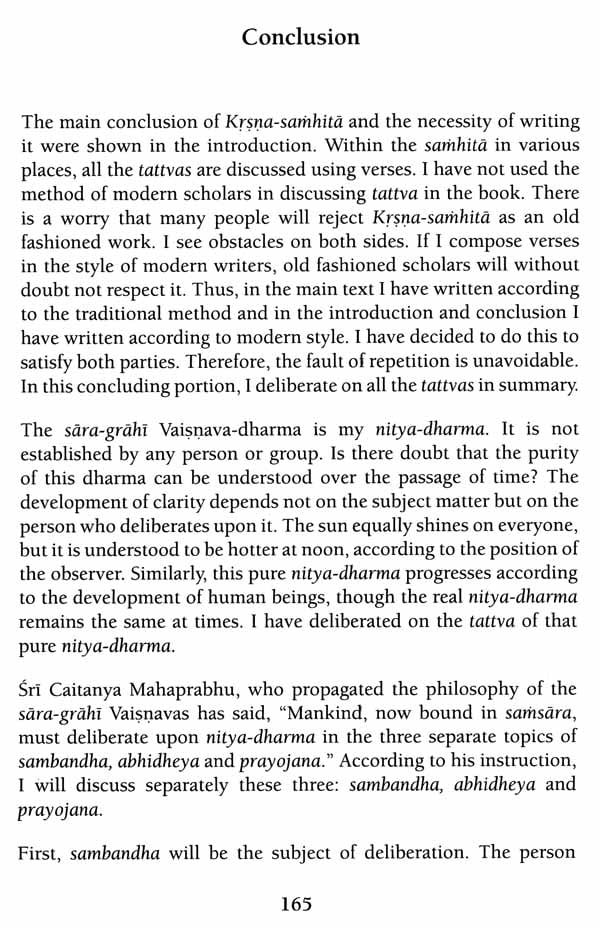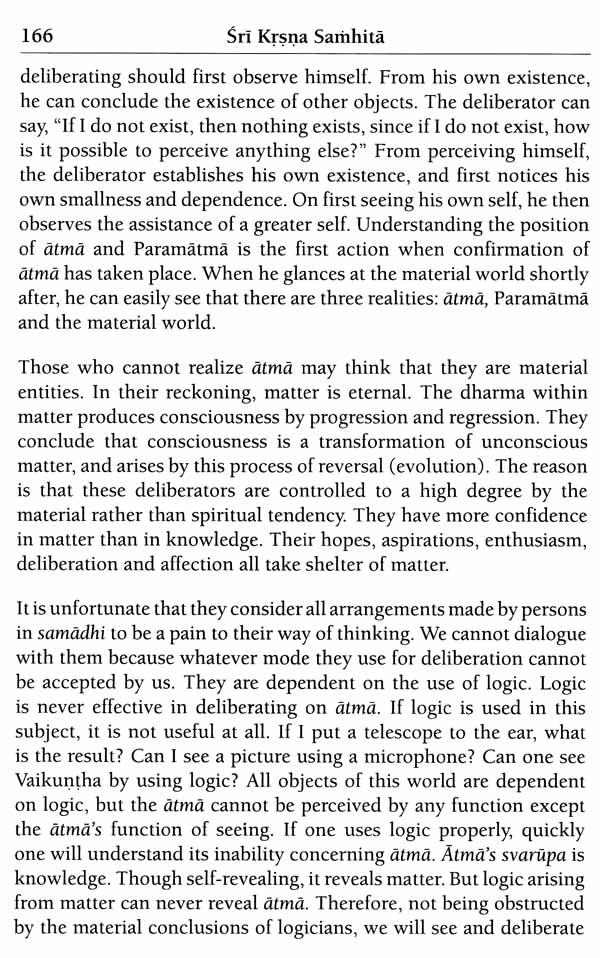
Sri Krsna Samhita
Book Specification
| Item Code: | NAX638 |
| Author: | HH Bhanu Swami Maharaj |
| Publisher: | Iskcon, Chennai |
| Language: | English |
| Pages: | 214 |
| Cover: | PAPERBACK |
| Other Details | 8.50 X 5.50 inch |
| Weight | 250 gm |
Book Description
There are two types of scripture: those which give material results and those which give spiritual results. Geography, history, astronomy, physics, psychology, Ayurveda, microbiology, mathematics, linguistics, poetry, music, logic, yoga, dharma, penal law, crafts, and ballistics, etc., are included in scriptures which give material results. Those scriptures clarify a subject and give direct results following that knowledge. That is their artha or purpose. All these goals mutually assist each other and finally give rise to the highest result, the highest goal of the atma. This is called the paramartha. That scripture which examines how to attain this highest result is called the spiritual scripture.
Many spiritual scriptures have been written in India and in foreign countries. The sages of India deliberated on the highest spiritual goal from long ago and produced many spiritual scriptures. Among them, Bhagavatam is the chief. This scripture is huge, consisting of eighteen thousand verses. In this work, while discussing the ten topics of sarga, visarga, sthana, posana, uti, manvantra-Katha, ISa-Katha, nirodha, mukti and asraya - in some places as direct teachings and in some places as history and various other topics -all tattvas of the world have been discussed. Among them, the topic of asraya is the spiritual goal.
Asraya-tattva is very deep and unlimited. Though this asraya-tattva is self-revealing, in the present bound state of humanity, it is difficult to reveal clearly this spiritual subject. Therefore, with the hope that one understands clearly the tenth topic as presented in Bhagavatam, one must study the previously mentioned nine topics.
Till now, this remarkable book has not been explained nicely. Humans of this country can be divided into two groups: those who carry burden (bhara-vahi) and those who accept the essence (saragrahi). Most are burden carriers. Those who accept the essence are few. They personally grasp the real meaning of the scripture and produce elevation for themselves. Therefore, till now the real meaning of Bhagavatam has not been shown clearly. I had a great desire to translate the Bhagavatam with the essential meaning but have not had the time to translate this huge text. Therefore, I have now gathered in Krsna-samhita all the necessary topics by taking the essential meaning of that scripture. Not content simply to gather the topics, I translated them into Bengali. I hope that wise men will reflect on this work deeply for defining the supreme spiritual tattva.
Everyone is qualified for the spiritual tattva. However, according to the qualification of the deliberator, one may divide people into three groups.' Those who have not developed the power to deliberate independently are in the first division called komala-Sraddha. They have no alternative except faith. If they do not accept as the order of the Lord, what the writers of scripture say, then they fall. They are qualified for the gross meaning of krsna-tattva. They are not qualified for deliberating on the subtle meaning. Until they progress gradually by devotee association and proper instructions, they must try to advance under the shelter of faith.
Those who are not expert at being able to join logic with faith are counted as the madhyama-adhikari or yukty-adhikari (qualified for logic). Those persons who are expert in joining the two (logic and faith) achieve all success. They can achieve the highest spiritual goal through independent actions, using all objects. They are called uttama-adhikaris. Among these three types of deliberators, who is qualified for this book? One must discern this. The komala-Sraddha is not qualified. But by good fortune, gradually gaining a higher qualification, they can become qualified.
Those who are most expert (uttama-adhikaris) have no direct need of this work except to confirm their conclusions. However, by deliberating on this work, they respect this book in order to elevate the madhyama-adhikaris. Thus, the madhyama-adhikaris are truly qualified for this book. All three categories of people are qualified for Bhagavatam. All the current commentaries on this astonishing work were written to help the komala-Sraddha persons. The writers of the commentaries were sara-grahis, but they did not show as much mercy to the madhyama-adhikaris as they did to the komala-Sraddhas. When considering jnana, they write about kevala-brahma-jnana which is not helpful to present day logicians.
**Contents and Sample Pages**
